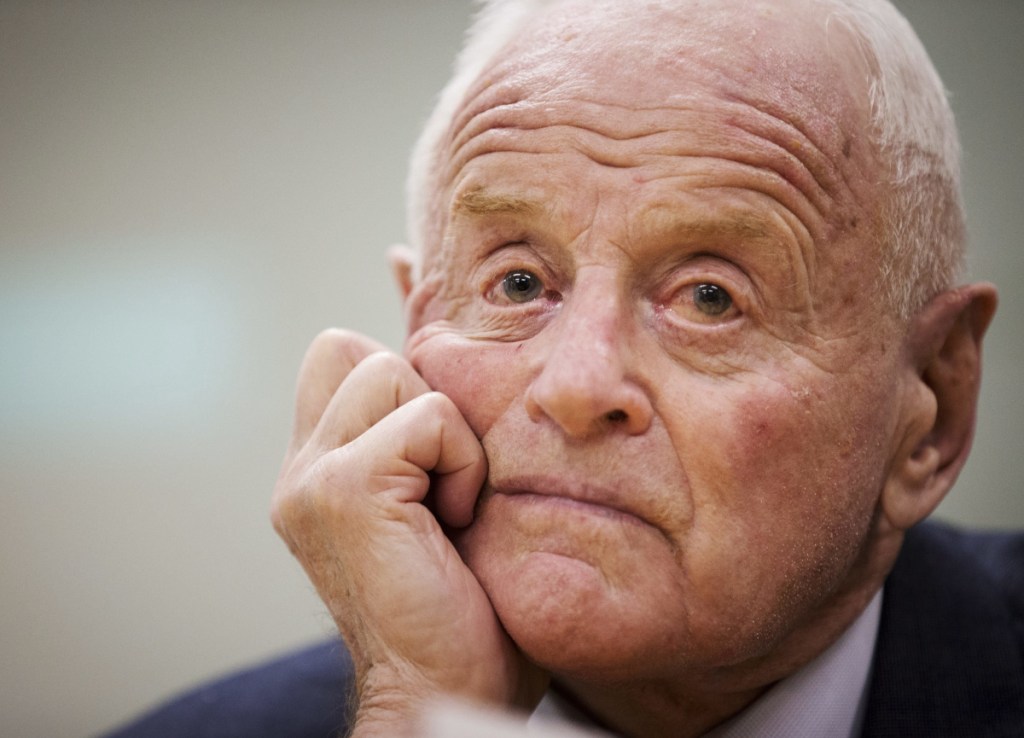Peter Munk, the Canadian immigrant who founded Barrick Gold Corp. in the early 1980s and transformed it from a small-scale operation into a global empire, has died. He was 90.
He died Wednesday in Toronto, according to a company statement. No cause was given.
A serial entrepreneur, Munk’s ventures ranged from high-end electronics to real estate. But it was as founder of Toronto-based Barrick, the world’s largest gold producer, that he amassed most of his wealth, the bulk of which he pledged would go to charities after his death.
Born in Budapest on Nov. 8, 1927, to Lajos Munk and Katharina Adler, Munk fled Nazi-occupied Hungary in 1944 with his father’s family.
His mother, who left the marriage when Peter was 4 and had survived the Auschwitz concentration camp, committed suicide in 1988.
In 1948, Munk’s father sent him from an internment camp in Switzerland to live in Canada with an uncle. In a 1998 interview, Peter Munk said he initially dreaded the move. “But I was determined to succeed,” Munk said. “I probably had enough misguided self-confidence to think I could do it in Canada even though I couldn’t speak the language and didn’t have any contacts.”
Munk would later describe his first years in Canada as a kind of love affair.
After the deprivation of postwar Europe, food was abundant and friends welcomed him into their homes with open fridges even though he “arrived in this place not speaking the language, not knowing a dog.” He worked a series of odd jobs — selling Christmas trees, harvesting tobacco, clearing bush — and graduated from the University of Toronto with a degree in electrical engineering in 1952.
Munk’s account of his childhood and early years in Canada reflected an optimism that remained throughout his life, according to his daughter, Nina Munk, a New York-based journalist. “For my father, the glass is always half full,” she said in a July 2017 interview.
It was a quality that would be tested by the shifts in fortune that are the hallmark of an entrepreneur’s life. Nina was born in 1967, the year Munk’s first business, Clairtone Sound Corp., collapsed. Her father remembered it as “the worst year of his life,” according to her 2008 book about the venture, “The Art of Clairtone.”
For almost a decade Clairtone’s mid-century Danish-inspired stereos were purchased by celebrities such as Frank Sinatra, Hugh Hefner and jazz musician Oscar Peterson. But cost overruns, a too-early foray into color television and an ill-fated shift of operations to Nova Scotia contributed to steep losses in the late 1960s. Munk was ejected from management in 1968 and later sued for insider trading. His first big success was also his most humiliating failure.
At the same time, his first marriage, to Linda Gutterson, collapsed. In 1969 she moved to Switzerland with Nina and her older brother, Anthony. Munk would later tell Nina he spent more money on Anthony’s school tuition than he earned that year. In fact, Munk’s lifestyle changed little over the years: regardless of how business was doing, he always wore bespoke Italian suits, monogrammed Charvet shirts and Borsalino hats, Nina recalled, while priding himself on avoiding the decadence of the mega-rich.
“We always lived well,” Nina said. “To my father, deals that went south, share prices that collapsed, companies that went bust were merely blips on the path to success. He never doubted he would make it all back, and then some. So why engage in belt-tightening?”
In 1970, Munk decamped to London where he and business partner David Gilmour started their next venture, developing a 7,000-acre resort in Fiji and 50 hotels throughout the Pacific Basin.
The audacity of the venture, coming on the heels of the Clairtone failure, suggests more than optimism was at play. Canadian author Peter C. Newman wrote there were three great motivators in Munk’s life: restitution, redemption and revenge. “It was about giving the finger to all those snotty guys from Upper Canada College and Harvard’s business school who never waved goodbye as he departed for his exile in the South Pacific after the Clairtone fiasco,” according to Newman’s 2014 article in Maclean’s, a Canadian publication.
In 1979, Munk returned returned to Canada and in 1981 he sold Southern Pacific Properties, walking away with about $100 million. A year earlier he had started Barrick Petroleum, an oil and gas exploration company, but soon shifted to gold.
Copy the Story LinkSend questions/comments to the editors.



Success. Please wait for the page to reload. If the page does not reload within 5 seconds, please refresh the page.
Enter your email and password to access comments.
Hi, to comment on stories you must . This profile is in addition to your subscription and website login.
Already have a commenting profile? .
Invalid username/password.
Please check your email to confirm and complete your registration.
Only subscribers are eligible to post comments. Please subscribe or login first for digital access. Here’s why.
Use the form below to reset your password. When you've submitted your account email, we will send an email with a reset code.